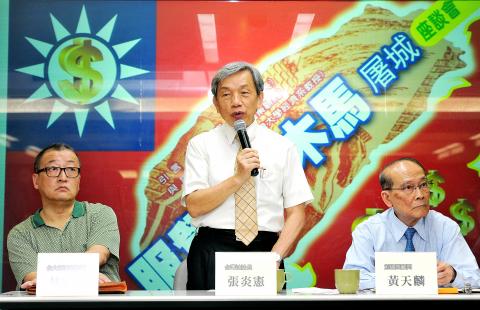|
Analysts criticize
Ma’s cross-strait pacts
MANIPULATION: Critics said Ma Ying-jeou had
allowed China to gain the upper hand by ignoring the WTO’s mechanism option in
expanding cross-strait trade
By Chris Wang / Staff reporter

Taiwan Society president Chang
Yen-hsien, center, is flanked by former presidential advisor Huang Tien-lin,
right, and National Taiwan University economics professor Kenneth Lin at a forum
in Taipei yesterday discussing the impact of the cross-strait service trade
agreement. The forum was organized by the Taiwan Society.
Photo: Chien Jung-fong, Taipei Times
The Economic Cooperation Framework
Agreement (ECFA) and the recently signed service trade service agreement were
not necessary, because the WTO mechanism would be enough to deal with the
cross-strait trade relations, experts said yesterday, adding that the deals were
part of a carefully crafted plan by President Ma Ying-jeou (馬英九) and Beijing for
eventual unification.
“The essence of these trade agreements was 70 percent political and 30 percent
economic,” former presidential advisor Huang Tien-lin (黃天麟) told a symposium
organized by the Taiwan Society.
“I would say that the ECFA has been a ‘Trojan horse’ and represented ‘eventual
colonization framework arrangement’ which will lead to a peace agreement and
unification,” he said.
Huang said the service trade agreement, along with Ma’s planned free economic
pilot zones across the country and China’s Pingtan Comprehensive Experimental
Zone and Western Taiwan Straits Economic Zone, formed part of Beijing’s
strategic triangle between this year and 2016, with an aim of absorbing Taiwan.
The other sides of the triangle included the establishment of representative
offices on each other’s territory and the “one China” framework, which Ma’s
Chinese Nationalist Party (KMT) recently advocated in a meeting with Chinese
President Xi Jinping (習近平), Huang said.
The signing of these trade agreements will make the eventual one China market
inevitable because of the free flow of investment, personnel and products across
the Taiwan Strait, said Kenneth Lin (林向愷), an economist at National Taiwan
University.
Ma is responsible for its decision to make the Cross-Strait Economic Cooperation
Committee, which consists of government officials from Taiwan and China
designated to ECFA-related affairs, including trade disputes, an entity that
could not be monitored by the legislature, as well as negotiating for the
service trade pact before the trade in good pact — in reverse order from most
free-trade agreements, Lin said.
The president appeared to have intentionally avoided going through the WTO
mechanism, which is risks making the cross-strait trade ties a domestic affair,
he said, adding that the Ma administration has also made a fatal mistake by
focusing on the number of liberalized sectors.
While China has offered to liberalize 80 sectors, more than the 64 that Taiwan
has promised, liberalization of several critical sectors, such as banking, was
conditional and limited, Lin said.
For example, Taiwanese banks are allowed to establish branches and e-commerce
companies could operate only in Fujian Province.
The strategy aimed to incorporate Taiwanese businesses in Beijing’s Western
Taiwan Straits Economic Zone project and absorb investment, personnel and
know-how from Taiwan’s service providers, , the economicst said.
The Democratic Progressive Party’s (DPP) strategy for opposing the trade pact
has highlighted the opaque negotiation process, but failed to address the
agreement’s overall social impact, including erosion of the freedom of speech,
the influence of Beijing’s state capital and a potential monopsony, Lin said.
For example, Beijing could manipulate Taiwanese e-commerce service providers
with its control of the Internet content provider (ICP) licenses and dominate
Taiwan’s tourism market with increasing numbers of Chinese tourists, Lin said.
With numerous companies of state capital background, China could focus on
disrupting the Taiwanese market, if it wanted, without the pressure of
generating profits, he added.
Free trade has long been the DPP’s Achilles’ heel because cannot risk opposing
free trade outright, Lin said.
“However, when the benefit of free trade cannot be enjoyed by everyone and the
wealth gap keeps widening because of the system, the effect of engaging in a
free-trade system is questionable, let alone Taiwan’s wrong strategy in making
China — rather than the US, the EU or Japan — the top priority pursuing the
free-trade agreements,” he said.
The DPP should tackle that issue, Lin said.
|
![]()
![]()
![]()